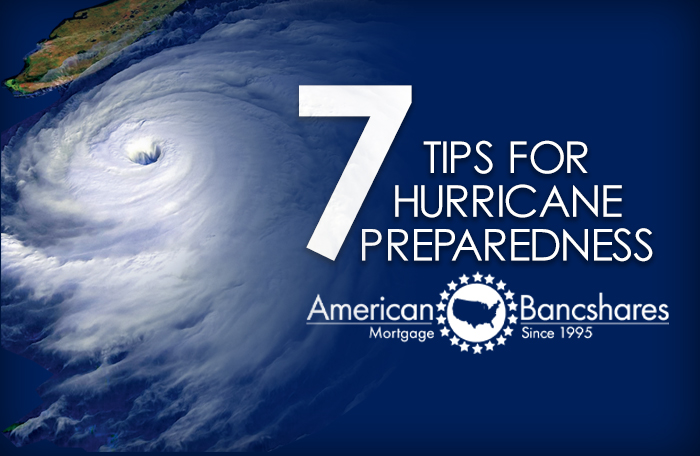
7 Tips For Hurricane Preparedness
August 26, 2020
7 Hurricane Tips
American Bancshares Mortgage is encouraging everyone to prepare for hurricane season by assessing their home’s risk and developing emergency plans to protect against storms. Here are seven tips that are sure to be of use:
Know your risk. FEMA’s map service center will show you the flood risk for your community, which helps determine the type of flood insurance coverage you will need since standard homeowners insurance doesn’t cover flooding.
Assemble an emergency kit. The emergency kit should include first aid supplies, a flashlight, extra batteries, at least three days of non-perishable foods and water, towels and a supply of any necessary medications. Stay informed of the Hurricane’s path and progress by monitoring Wireless Emergency Alerts via text message and having a battery-powered radio or TV available.
Develop a family communications plan. Know how you will contact one another; how you will get back together, if separated; and what you will do in different situations. Having a plan can eliminate some of the stress and confusion.
Establish an evacuation route. Prior to a Hurricane, contact your local American Red Cross to locate the shelter nearest you or download their Shelter Finder App. Identify the safest route to get there. Be sure to check if your local emergency shelter allows animals and family pets.
Secure your home. Outdoor furniture and other objects can pose a potential hazard. Turn off propane tanks and other utilities if instructed to do so by emergency personnel.
Protect financial documents. In the event of a disaster, you will need identification and financial documents to begin the recovery process. Safeguard important documents in a bank safety deposit box, computer storage devices (USB drive, CD/DVD), the cloud, and/or waterproof storage containers, including:
Personal identification (driver’s licenses, birth certificates, military IDs, passports, etc.)
Financial account information (checking, savings, retirement and investment accounts, credit/debit cards).
Insurance policies on all personal property, including appraisals and lists and photos of valuable items.
Ownership or leasing documentation for homes and vehicles (deeds, titles, registrations, rental agreements, etc.)
All health and medical insurance documentation.
Know the details of your insurance policy. Talk with your agent to determine if you have adequate coverage or if you need to reassess your plan. This is especially important if your property’s flood map has changed.
The FEMA website,Ready.gov, offers tips on preparing for an emergency. FEMA offers a free app that is available for download through your smart phone. For more resources, visit the FEMA site: http://www.ready.gov/hurricanes.




